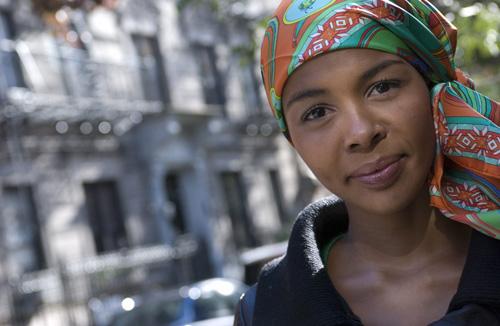German-born Ayo’s ‘Joyful’ debut tinged with sadness

Jim Cooper, The Associated Press
Nov 28, 2007
NEW YORK – Even on a cold and rainy afternoon, Ayo, whose first name means joy in the African Yoruba language, radiates warmth. She smiles genuinely and laughs often. Yet sadness permeates her debut disc “Joyful” – a somberness that comes from a turbulent upbringing.
“Music to me is like therapy,” the 27-year-old singer-songwriter says over lunch at a small bistro in New York City’s West Village.
“(Through music) I’m trying to help myself and my family,” she says later.
Ayo, whose last name is Ogunmakin but simply goes by her first name, was born to a Romanian mother and Nigerian father. She describes her mother as a heroin addict who came in and out of her life; her parents divorced when Ayo was seven.
But her father, a mechanical engineer, was not allowed to raise Ayo and her three older siblings – social services declared him unfit to raise his kids as a single parent. Ayo, who says it took years for him to regain custody, blames the racial climate in Germany for that decision.
Get The Daily Illini in your inbox!
“Sometimes I lived in little villages with my Dad because we had to move with him, and there were all these old people looking at (me) like (I was) a monkey,” she recalls of her biracial childhood in Germany.
Ayo’s bittersweet memories are found on her debut, released this month, in songs like the touching “Without You,” dedicated to her father, and “Help is Coming,” a plaintive plea to her mother.
“I hope one day I can sit with my mother and find a way through to her. With music I have a feeling I can reach her,” she says in an accent that reflects both her Nigerian and German roots.
Ayo credits her father, who was also a part-time DJ, with introducing her to music; she remembers him playing classic Stax soul records when she was young. He encouraged her to pursue a music career, and by 19, she was already garnering interest from different record labels. One wanted her to go in a more pop direction and turn her into the black Britney Spears – another wanted her to be a reggae artist.
Instead, Ayo, whose earnest lyrics, raspy vocals and self-taught acoustic guitar playing have earned her comparisons to Tracy Chapman and Joan Armatrading, rejected the offers and decided to leave her hometown of Colonge. She moved to Hamburg, then left Germany altogether for London when she was 22. As a parting gift to herself, Ayo purchased a steel string guitar that she named “Billy.”
“When I went to London, I didn’t have friends but I had this guitar,” says Ayo. “It was like the guitar was talking to me. The chords gave me a sense of what I wanted to say.”
Ever the nomad, Ayo moved to Paris a year later. There, she became an unsigned hype who quickly graduated from playing in bars to headlining a sold-out show at the prestigious Olympia Theater.
“That’s where I felt at home for the first time,” Ayo says while trying to feed her two-year old son bites of ravioli dipped in ketchup. “I went to Paris and didn’t speak the language, but I felt like this was a place for me. I was not the colored girl anymore.”
The stunning singer says Parisians appreciate “good acoustic music,” and word of mouth kept Ayo in the French press; she got a record deal with Universal/Polydor in 2003.
“Joyful,” however, wasn’t released until 2006. During that three-year period, she looked for the right producer and reunited with a former boyfriend, who inspired the reggae-tinged “Down on My Knees,” and together they had their son, Nile. The reflective “These Days,” where she ponders, “Where should I go when earth’s the only place I know?” is about that uncertain period.
“Today I try to be optimistic, but I don’t know if it’s always possible,” says Ayo. “Sometimes you have to allow yourself to be pessimistic. There’s a power in tragedy.”
Norah Jones’ producer Jay Newland recorded “Joyful” with Ayo and a live band over five days in New York City. He describes her music as “full of life and love.”
Event producer Jill Newman, who hired Ayo to open for Sly & the Family Stone in New York City, calls her “a unique musician and vocalist.
“(She) weaves her stories set to her glorious music leaving you deeply feeling and thinking long after the song is sung.”
Ayo is now on a nationwide tour with Babyface and is featured on a new PBS concert special. She recently settled in Manhattan and finally has the stable family life she’s craved.
“I moved around so much and it’s tiring. Now it’s exciting (having a real home),” she says.





